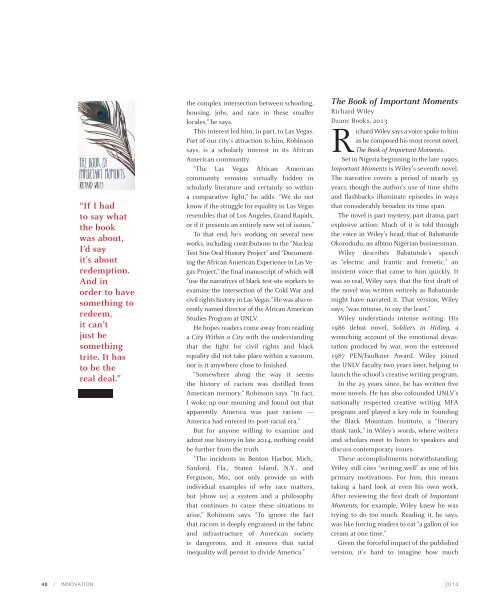innovation-2014
innovation-2014
innovation-2014
You also want an ePaper? Increase the reach of your titles
YUMPU automatically turns print PDFs into web optimized ePapers that Google loves.
“If I hadto say whatthe bookwas about,I’d sayit’s aboutredemption.And inorder to havesomething toredeem,it can’tjust besomethingtrite. It hasto be thereal deal.”the complex intersection between schooling,housing, jobs, and race in these smallerlocales,” he says.This interest led him, in part, to Las Vegas.Part of our city’s attraction to him, Robinsonsays, is a scholarly interest in its AfricanAmerican community.“The Las Vegas African Americancommunity remains virtually hidden inscholarly literature and certainly so withina comparative light,” he adds. “We do notknow if the struggle for equality in Las Vegasresembles that of Los Angeles, Grand Rapids,or if it presents an entirely new set of issues.”To that end, he’s working on several newworks, including contributions to the “NuclearTest Site Oral History Project” and “Documentingthe African American Experience in Las VegasProject,” the final manuscript of which will“use the narratives of black test-site workers toexamine the intersection of the Cold War andcivil rights history in Las Vegas.” He was also recentlynamed director of the African AmericanStudies Program at UNLV.He hopes readers come away from readinga City Within a City with the understandingthat the fight for civil rights and blackequality did not take place within a vacuum,nor is it anywhere close to finished.“Somewhere along the way it seemsthe history of racism was distilled fromAmerican memory,” Robinson says. “In fact,I woke up one morning and found out thatapparently America was past racism —America had entered its post-racial era.”But for anyone willing to examine andadmit our history in late <strong>2014</strong>, nothing couldbe further from the truth.“The incidents in Benton Harbor, Mich.,Sanford, Fla., Staten Island, N.Y., andFerguson, Mo., not only provide us withindividual examples of why race matters,but [show us] a system and a philosophythat continues to cause these situations toarise,” Robinson says. “To ignore the factthat racism is deeply engrained in the fabricand infrastructure of American societyis dangerous, and it ensures that racialinequality will persist to divide America.”The Book of Important MomentsRichard WileyDzanc Books, 2013Richard Wiley says a voice spoke to himas he composed his most recent novel,The Book of Important Moments.Set in Nigeria beginning in the late 1990s,Important Moments is Wiley’s seventh novel.The narrative covers a period of nearly 35years, though the author’s use of time shiftsand flashbacks illuminate episodes in waysthat considerably broaden its time span.The novel is part mystery, part drama, partexplosive action: Much of it is told throughthe voice in Wiley’s head, that of BabatundeOkorodudu, an albino Nigerian businessman.Wiley describes Babatunde’s speechas “electric and frantic and frenetic,” aninsistent voice that came to him quickly. Itwas so real, Wiley says, that the first draft ofthe novel was written entirely as Babatundemight have narrated it. That version, Wileysays, “was intense, to say the least.”Wiley understands intense writing. His1986 debut novel, Soldiers in Hiding, awrenching account of the emotional devastationproduced by war, won the esteemed1987 PEN/Faulkner Award. Wiley joinedthe UNLV faculty two years later, helping tolaunch the school’s creative writing program.In the 25 years since, he has written fivemore novels. He has also cofounded UNLV’snationally respected creative writing MFAprogram and played a key role in foundingthe Black Mountain Institute, a “literarythink tank,” in Wiley’s words, where writersand scholars meet to listen to speakers anddiscuss contemporary issues.These accomplishments notwithstanding,Wiley still cites “writing well” as one of hisprimary motivations. For him, this meanstaking a hard look at even his own work.After reviewing the first draft of ImportantMoments, for example, Wiley knew he wastrying to do too much. Reading it, he says,was like forcing readers to eat “a gallon of icecream at one time.”Given the forceful impact of the publishedversion, it’s hard to imagine how much40 / INNOVATION<strong>2014</strong>


